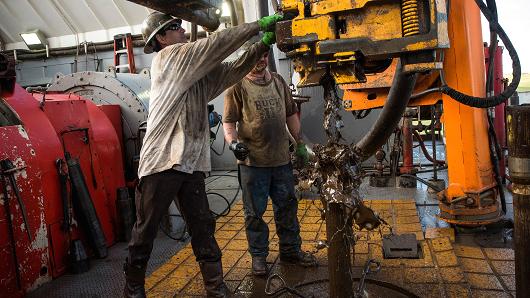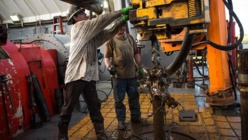For U.S. shale oil producers $40 is going to be the new $70.
A couple of months back, shale oil companies in the U.S. had said they found it unprofitable to drill below prices of $60 a barrel. Now however some oil producers are willing to settle for far less, in signs of what is likely to be increased efficiency in drilling operations.
This marks not only the industry’s astounding resilience but also serves as a warning to rivals that the U.S. oil industry is now a player. Earlier, OPEC and non-OPEC members had hoped retreating U.S. oil productions are likely to ease the glut in the oil pool. Recovery of oil prices is likely to be shorter than expected.
As per John Hart, Continental Resources Inc.’s CFO, Harold Hamm, its CEO, is prepared to increase capital expenditure if U.S. crude CLc1 hovers in the range of $40. If this were to happen, the company would be in a position to boost its 2017 production by 10%.
Similarly, Jim Volker, Chairman and CEO of Whiting Petroleum Corp, the biggest producer in North Dakota's Bakken formation, is likely to "consider completing some of these wells" if oil prices reach in the range of $40-$45 a barrel. This is in stark contrast to its earlier position, less than a year ago, when Volker had said that more oil rigs could be deployed if U.S. crude hits $70, which only goes to reflect the giant strides of efficiency of U.S. shale oil in the course of a couple of months.
Although U.S. shale oil producers have cut back on productions due to the nearly 70% slide in oil prices, increased efficiency in their operation have also limited the impact of any rally in oil prices.
The threat of a shale rebound is "putting a cap on oil prices," said John Kilduff, partner at Again Capital LLC. "If there's some bullish outlook for demand or the economy, they will try to get ahead of the curve and increase production even sooner."
Already a couple of producers have begun hedging future productions with prices for 2017 oil trading at near $45 a barrel. This could effectively block any future production cuts.
However, in a world where certainty does not exist, analysts are unsure whether oil will reach $40 a barrel anytime soon. ANZ and Morgan Stanley expects oil prices to be in their mid $30s for the rest of the year.
Some analysts have even warned that resuming oil operations may prove to be harder than expected as thousands of workers have been laid off and three quarters of U.S. oil rigs have laid idle since late 2014.
John Hess, CEO of Hess Corp has in fact labelled U.S. shale oil as a "swing producer." During an interview he has said U.S. shale firms should be seen as "short-cycle" producers, who might need up to a year to stop or restart production.
Even if oil prices recover, scarred veterans of past boom-bust oil cycles are unsure of what will follow suit. Despite being veterans of the oil industry, they don’t have any experience to fall back on – in the last decade shale oil did not even exist.
“We are a little concerned that this time there is one dynamic we've never had previously," said Darrell Hollek, VP Anadarko Petroleum Corp.
A couple of months back, shale oil companies in the U.S. had said they found it unprofitable to drill below prices of $60 a barrel. Now however some oil producers are willing to settle for far less, in signs of what is likely to be increased efficiency in drilling operations.
This marks not only the industry’s astounding resilience but also serves as a warning to rivals that the U.S. oil industry is now a player. Earlier, OPEC and non-OPEC members had hoped retreating U.S. oil productions are likely to ease the glut in the oil pool. Recovery of oil prices is likely to be shorter than expected.
As per John Hart, Continental Resources Inc.’s CFO, Harold Hamm, its CEO, is prepared to increase capital expenditure if U.S. crude CLc1 hovers in the range of $40. If this were to happen, the company would be in a position to boost its 2017 production by 10%.
Similarly, Jim Volker, Chairman and CEO of Whiting Petroleum Corp, the biggest producer in North Dakota's Bakken formation, is likely to "consider completing some of these wells" if oil prices reach in the range of $40-$45 a barrel. This is in stark contrast to its earlier position, less than a year ago, when Volker had said that more oil rigs could be deployed if U.S. crude hits $70, which only goes to reflect the giant strides of efficiency of U.S. shale oil in the course of a couple of months.
Although U.S. shale oil producers have cut back on productions due to the nearly 70% slide in oil prices, increased efficiency in their operation have also limited the impact of any rally in oil prices.
The threat of a shale rebound is "putting a cap on oil prices," said John Kilduff, partner at Again Capital LLC. "If there's some bullish outlook for demand or the economy, they will try to get ahead of the curve and increase production even sooner."
Already a couple of producers have begun hedging future productions with prices for 2017 oil trading at near $45 a barrel. This could effectively block any future production cuts.
However, in a world where certainty does not exist, analysts are unsure whether oil will reach $40 a barrel anytime soon. ANZ and Morgan Stanley expects oil prices to be in their mid $30s for the rest of the year.
Some analysts have even warned that resuming oil operations may prove to be harder than expected as thousands of workers have been laid off and three quarters of U.S. oil rigs have laid idle since late 2014.
John Hess, CEO of Hess Corp has in fact labelled U.S. shale oil as a "swing producer." During an interview he has said U.S. shale firms should be seen as "short-cycle" producers, who might need up to a year to stop or restart production.
Even if oil prices recover, scarred veterans of past boom-bust oil cycles are unsure of what will follow suit. Despite being veterans of the oil industry, they don’t have any experience to fall back on – in the last decade shale oil did not even exist.
“We are a little concerned that this time there is one dynamic we've never had previously," said Darrell Hollek, VP Anadarko Petroleum Corp.















